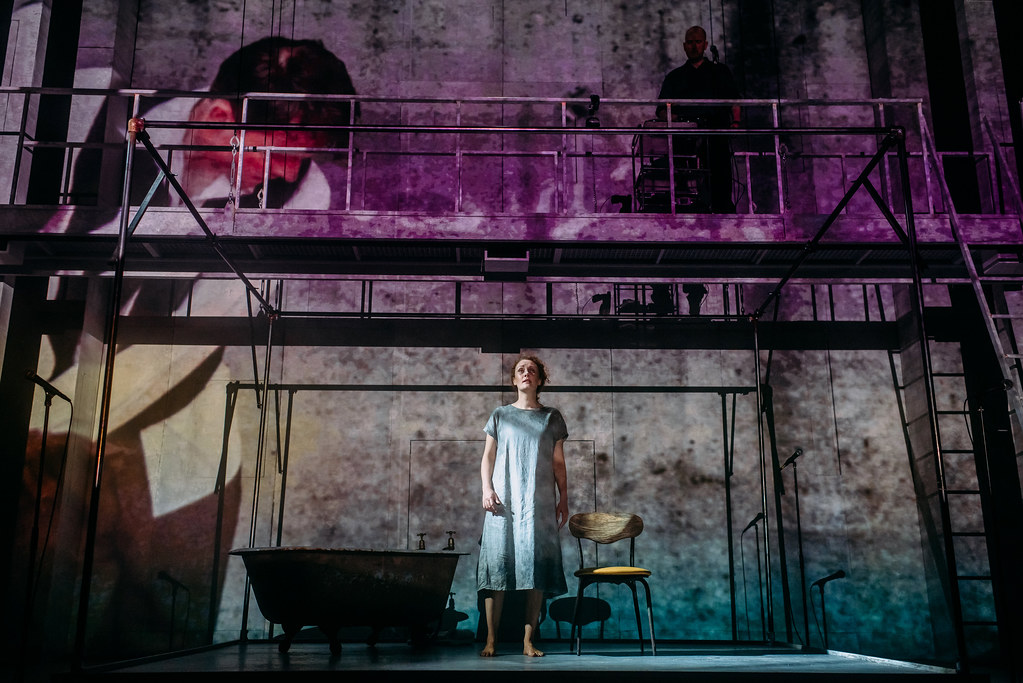The timeless power of John Webster’s The Duchess of Malfi lies in its language. Poetic couplets bear poignant themes and soaring character arcs, soliloquies reveal rich and real characters who converse in equal parts realism and art. Unfortunately, however, it is not Webster’s play that takes to the Lyceum’s stage, but the ‘radical’ take of Zinnie Harris. The Duchess (of Malfi), an artless modernisation of an already pertinent play that all but bastardises Webster’s classic, stripping the language and plugging the gaps with empty vernacular that leaves the play without substance, soul, or interest.
The play follows the recently widowed Duchess (Kirsty Stuart) after the welcome death of her husband grants her a power and autonomy rare to contemporary women. In courageous defiance of her controlling brothers, Ferdinand (Angus Miller) and the Cardinal (George Costigan), the Duchess braves marriage again, for the sake of love. It’s an act of empowerment that her brothers will bloody their hands to quash.
Much to the delight of the brothers, Harris’ script manages to entirely disempower the Duchess for them. It removes but does not replace the various soliloquies and asides that constitute the rich, artistic realism for which she — and all the other characters — are known. The cast is helpless, deprived of neither the quality or quantity of lines to work with. Many integral scenes, such as the touching moments of intimacy between the Duchess and new husband Antonio (Graham Mackay-Bruce), along with Antonio and Delio’s (Adam Tompa) opening observations of the court, and the foreshadowing of Antonio’s handkerchief, are whittled to irrelevancy or cut entirely. Interactions are bereft of emotion and drama, shallow to the point of audience apathy and prevent any meaningful character arc. Even Bosola (Adam Best), the contentious anti-protoganist of the play, is a dull shell, despite the laudable efforts of Best.
Salt is only added to the wound by the random addition of a fleeting and pointless romance between Bosola and the Duchess’ maid Cariola (Fletcher Mathers) that adds nothing to the play but confusion.
What the play lacks in depth, characterisation and interesting language it attempts to compensate for through gratuitous violence and torture scenes. The Duchess of Malfi is a tragedy — murder is on the menu and the audience knows it — however, Harris takes this key element to a frankly tasteless, potentially immoral degree. The worst of several such moments is the huge continuous looped video of the explicit execution of children — the production’s interpretation of the crucial scene where the Duchess is deceived into thinking her children have been murdered — which is graphic to the point of artlessness: the attempt to convey of the horror felt by the Duchess fails, and the violence exists for violence’s sake.
One element in particular stands as the sole redeemer of the play, namely the oftentimes bizarre scene where the spirit of the late Duchess returns as an echo. Performed to a bewitching soundscape and elegantly choreographed, the moment is the closest the play comes to inciting emotion — before being promptly cut short by an unsentimental Antonio. Such musical elements offer a welcome flair and should have been embraced further.
It must be noted that this review comes to its judgement from a potentially uncommon familiarity with Webster’s original. Perhaps for those who haven’t previously encountered with the story of the Duchess, Harris’ rendition is an easy way of accessing the play. However, this interpretation honours Webster’s classic in nothing but name — the door to the play may appear more open, but as a consequence, that which lies within is no longer worth discovering.

